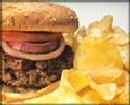Taxes could spur lower calorie choices, study finds

The study, published in the American Journal of Clinical Nutrition, examined the hypothetical food choices of 178 US college students on three separate occasions. The prices for high-calorie food items in the computer-based experiment were increased each time, first by 25 percent and then by 50 percent, while about half the students were provided with calorie information and the other half were not.
The researchers, led by Dr. Janneke Giesen of Maastricht University in the Netherlands, found that participants chose fewer calories when there were higher taxes on higher-calorie foods, like bacon cheeseburgers, steak fajitas and brownies. The only group that saw no change in behavior when taxes were added were those eaters who were already more likely to monitor their calorie intake and were given calorie information. They already chose lower calorie items without intervention.
Policies to curb obesity
Providing more accessible nutritional information and making healthier foods relatively less expensive than higher calorie options have both been suggested as ways to curb excessive food consumption, and have also been proposed to help offset the cost of treating obesity-related illness, which has been estimated at about $147bn a year in the United States.
Providing calorie information on menus is a policy that has begun to be trialed across the country, and was introduced throughout New York City in 2008. But emerging research has suggested that this may not help curb consumption as much as anticipated. Earlier this month, a study from NYU’s School of Medicine for example, found that posting calorie counts on menus had little effect on food choices. On the whole, research into the effects of calorie labeling has provided inconsistent results, and this latest study suggests that implementing a two-pronged taxation and calorie labeling approach may not be as effective as taxation alone.
The authors concluded that a food tax of at least 25 percent “makes nearly everyone buy fewer calories. Calorie information on the other hand seems to interfere with taxing (especially for those who already have the intention to eat fewer calories).”
They added that further research is necessary to work out the effect of smaller taxes – which may be more politically viable than the 25 to 50 percent models used in their study.
Source: American Journal of Clinical Nutrition
Published online ahead of print January 26, 2011. doi: 10.3945/ajcn.110.008193
“Exploring how calorie information and taxes on high-calorie foods influence lunch decisions”
Authors: Janneke CAH Giesen, Collin R Payne, Remco C Havermans, and Anita Jansen.






